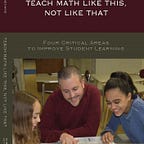Time for Math Teachers to Display Their Passion for Mathematics!
When the Common Core State Standards came out almost ten years ago, the Standards for Mathematical Practice were created. The practices “rest on important processes and proficiencies with longstanding importance in mathematics education.” There are core principles such as perseverance, reasoning, and modeling that I think are critical to develop with students. In rereading the document recently, I noticed the absence of some important words: joy, love, and passion, to name a few. The Standards for Mathematical Practice are the “expertise” that should be developed with students. Noted.
What about standards for the teachers of mathematics? What are the core standards or principles for instructing our students? I came across two resources. The National Board for Professional Teaching Standards published the Mathematical Standards for Teachers and Students ages 11–18+ and the National Council of Teachers of Mathematics published the book Principles and Standards for School Mathematics.
Mathematical Standards for Teachers
There are three Standards for the National Board “Teaching of Mathematics”: Learning Environment, Ways of Thinking Mathematically, and Assessment. There are some great fundamentals that I absolutely agree with such as the importance of knowing multiple ways to represent mathematical concepts, solving problems multiple ways, and developing mathematical discourse.
In the nearly 3,000-word section on the attributes of an accomplished mathematics teacher, there was not a mention of the terms joy, love, or passion.
The NCTM book “Principles and Standards for School Mathematics” specifies six principles which includes the Teaching of Mathematics on pages 16–19. I appreciate the focus on creating experiences for students, articulating that there is no one ‘right way’ to teach math, and allowing time for reflection. Once again though, I was not able to find any mention of those identified terms in this book.
Do you have the Passion?
The complete NCTM Principles for School Mathematics are Equity, Curriculum, Teaching, Learning, Assessment, and Technology. I am not here to argue against any of these six (different topic for a different day), but rather it is time to add a new principle: mathematics teacher’s passion for math.
I say that we add the Passion Principle. Something like… Teachers should promote the beauty and love of mathematics with their students through modeling.
The Principles are “statements reflecting basic precepts that are fundamental to a high-quality mathematics education.” I assert that we need to better promote our own love of the subject. If you enter a classroom of any of the other STEAM subjects (Science, Technology, Engineering, and Arts) you will likely observe passionate educators for their subject. I would assert that this is lacking in many math classes. My brothers and sisters, where is the passion for the subject that you spend 40, 50, or 60 hours a week devoted to?
Let’s Get Real
As a public school K-12 Math Coordinator, I am fully aware of the increased demands of teachers trying to “cover” too many standards, preparing and executing the high stakes standardized tests, and additional requirements that eat into precious instruction time. However, displaying your own love and passion for mathematics should not take one additional second of time. It is all about the delivery and excitement when you share with your class all the patterns in Pascal’s Triangle, or how the Babylonians solved quadratic functions. Allow your students to see that mathematics is stunning and you are proud to teach it!
If we do not want mathematics to be the ugly step-sister within the STEAM collaboration, we need to model for our students how much we love math! So, what made you fall in love with mathematics? The enthusiasm and joy that you have for the subject needs to be prominent in the classroom. If you are not excited about math, how would we expect our students to be?
